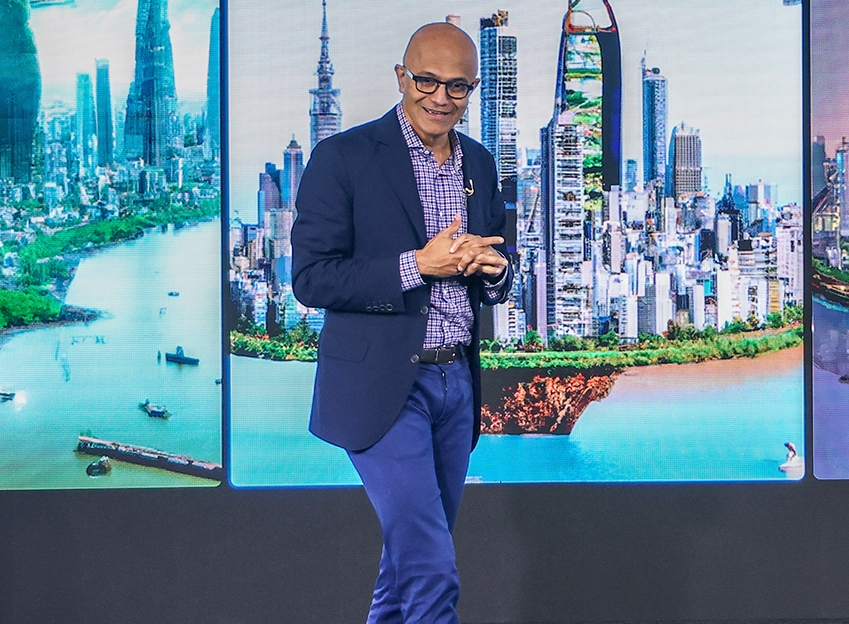As part of the initiative, Microsoft will raise awareness of responsible AI use and AI-enabled careers for 400,000 students in schools in remote and tribal regions, enabling them to be next-generation AI innovators…reports Asian Lite News
In a significant skilling initiative in India, Microsoft aims to equip 2 million people with AI skills by 2025.
The initiative called ADVANTA(I)GE INDIA is part of Microsoft’s ‘Skills for Jobs’ program, which is designed to empower India’s workforce with future-ready skills.
The initiative is part of Microsoft’s broader commitment to accelerate India’s AI transformation. The skilling initiative is aligned with the company’s responsible AI principles, and training will be delivered in partnership with governments, nonprofit and corporate organizations, and communities.
Microsoft chairman and CEO Satya Nadella, who is in India this week, announced at an event on Wednesday that Microsoft will equip 2 million people with AI skills in India by 2025.
According to Microsoft’s recent Work Trend Index, 90 percent of Indian leaders say the people they hire will need new skills to prepare them for the growth of AI. Furthermore, 78 percent of Indian workers say they don’t have the right AI capabilities to complete their current work.
To address this needs gap, ADVANTA(I)GE INDIA will focus on training individuals in Tier 2 and Tier 3 cities, as well as rural areas, enabling people to participate in the new era of AI and unlock inclusive socio-economic progress.
“The ADVANTA(I)GE INDIA initiative is a significant step towards democratizing access to AI skills across the nation and reflects Microsoft’s deep commitment to enabling inclusive growth with technology,” said Puneet Chandok, president of Microsoft India and South Asia.
“India has a huge opportunity to be a global leader in AI, and creating AI fluency at scale is a critical step in that journey. This initiative aims to propel India into a promising era of AI fluency, empowering citizens across India with the right skills to thrive in the age of AI.”
The ADVANTA(I)GE INDIA initiative will focus on three key areas to create AI fluency – Equipping India’s future workforce, upskilling government officials in AI and working to build the AI capability of nonprofit organizations.
To deliver ADVANTA(I)GE INDIA, Microsoft will partner with India’s Ministry of Skill Development and Entrepreneurship and 10 state governments to provide basic and advanced training in AI to 500,000 students and job seekers in 100 rural vocational education institutions and training centers.
This will expand on Microsoft’s existing collaboration with the ministry to train young people in digital and cybersecurity skills.
In addition, Microsoft will provide in-depth AI technical skills training for 100,000 young women through 5,000 trainers at higher education institutions in Tier 2 and Tier 3 cities.
As part of the initiative, Microsoft will raise awareness of responsible AI use and AI-enabled careers for 400,000 students in schools in remote and tribal regions, enabling them to be next-generation AI innovators.
Microsoft will strengthen its partnership with India’s National Programme for Civil Services Capacity Building, equipping 250,000 government officers with essential knowledge of generative AI and increasing their AI fluency.
It will enable 2,500 nonprofits and nongovernment organizations to leverage AI skilling resources and technologies to further train 750,000 learners – including underserved youths, young women, and jobseekers – in AI fluency and technical skills.
Over the past three years, Microsoft has provided more than 5,000 nonprofits in India with relevant, affordable, and innovative cloud and technology solutions. It has also helped more than 20,000 nonprofit employees use technology to accelerate their mission.
Microsoft entities in India have over 23,000 employees engaged in sales and marketing, research, development, customer support, and industry solutions across 10 Indian cities – Ahmedabad, Bengaluru, Chennai, New Delhi, Gurugram, Hyderabad, Kolkata, Mumbai, Noida, and Pune.
Microsoft offers its global cloud services from local datacenters to accelerate digital transformation across Indian startups, businesses, and government organizations.
Meanwhile, Microsoft Chairman and CEO, Satya Nadella announced that Microsoft will provide 2 million people in India with AI skilling opportunities by 2025, to help close skills gaps and strengthen India’s ability to thrive in the AI era.
“India is uniquely positioned to make the promise of AI a reality. We are committed to partnering broadly across the public and private sector to help close the nation’s AI skills gap and create new opportunities throughout the country,” Nadella told the gathering.
Nadella highlighted how Microsoft Copilot, along with the company’s other AI solutions, is driving measurable productivity gains for people and organisations by helping them complete work faster and with superior quality.
Many organisations in India are already accelerating innovation using Copilot for Microsoft 365 and GitHub Copilot, like Axis Bank, Infosys, HCL Tech, LTIMindtree and others.
Microsoft said that organisations in India are seeing an average $3.86 return for every US dollar spent on AI projects, and more than 150 organisations are already innovating with Azure OpenAI Service across industries such as agriculture, aviation, ecommerce, and fast-moving consumer goods.
Air India, the flag carrier airline, deployed a generative AI virtual agent called AI.g. It has successfully answered over half a million customer queries since its launch in March 2023, and manages over 6,000 queries a day in four languages.
With its fourth data centre region set to go live soon, and data centres in collaboration with Jio, Microsoft boasts more datacenter regions than any other cloud provider in the country.
ALSO READ-Nadella to visit India in Feb, discuss new AI opportunities

Leave a Reply